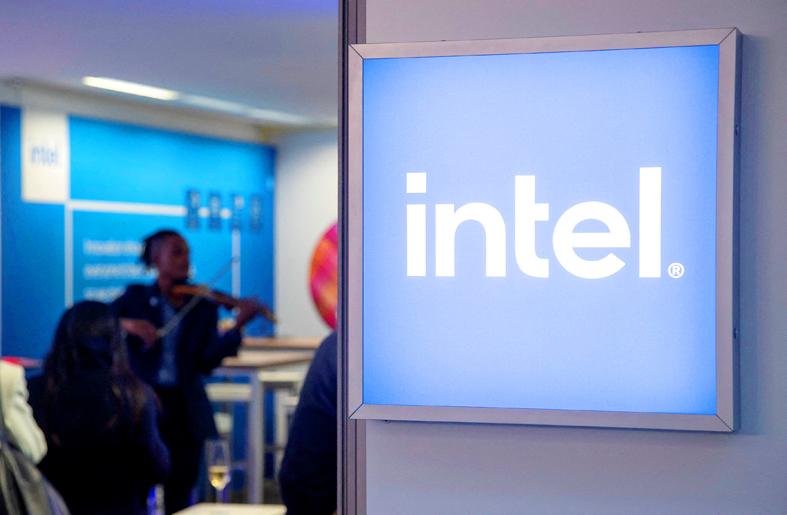Italy is close to clinching a deal initially worth US$5 billion with Intel Corp to build an advanced semiconductor packaging and assembly plant in the country, two sources briefed on discussions said yesterday.
Intel’s investment in Italy is part of a wider plan announced by the US chipmaker earlier this year to invest US$88 billion in building capacity across Europe, which is striving to cut its reliance on Asian chip imports and ease a supply crunch that has curbed output in the region’s strategic auto sector.
Asking not to be named due to the sensitivity of the matter, the sources said the government of outgoing Italian Prime Minister Mario Draghi was working to have an agreement in place by the end of this month, ahead of a snap national election scheduled for Sept. 25.

Photo: Reuters
Sources have previously told Reuters that Rome is ready to fund as much as 40 percent of Intel’s total investment in Italy, which is expected to rise over time from the initial US$5 billion.
Draghi’s office and Intel declined to comment.
The factory would use new technologies to weave together full chips out of tiles.
Intel and the government have shortlisted possible sites in two Italian regions, the sources said, with one of them saying they would be in the northern regions of Piedmont and Veneto.
A final decision on where to build the facility is yet to be made, both sources said. The Lombardy, Puglia and Sicily regions had also been considered initially.
The total size of Intel’s investment and how Italy plans to fund its share is not yet clear.
Under the so-called Chips Act aimed at funding innovative semiconductor facilities, the European Commission early this year said it had made available 15 billion euros (US$15.3 billion) in additional public and private investment by 2030. This is on top of 30 billion euros of public investments already planned from NextGenerationEU, Horizon Europe and national budgets.
Rome has so far set aside 4.15 billion euros until 2030 to attract chipmakers and invest in new industrial applications of innovative technologies.
The government is also in talks with French-Italian STMicroelectronics NV, US-based MEMC Electronic Materials Inc, Taiwan Semiconductor Manufacturing Co (台積電) and Israeli Tower Semiconductor Ltd, which Intel bought earlier this year.
STMicroelectronics last month signed a pact with GlobalFoundries Inc to build a US$5.7 billion chip factory in France.

South Korea’s equity benchmark yesterday crossed a new milestone just a month after surpassing the once-unthinkable 5,000 mark as surging global memory demand powers the country’s biggest chipmakers. The KOSPI advanced as much as 2.6 percent to a record 6,123, with Samsung Electronics Co and SK Hynix Inc each gaining more than 2 percent. With the benchmark now up 45 percent this year, South Korea’s stock market capitalization has also moved past France’s, following last month’s overtaking of Germany’s. Long overlooked by foreign funds, despite being undervalued, South Korean stocks have now emerged as clear winners in the global market. The so-called “artificial intelligence

‘SEISMIC SHIFT’: The researcher forecast there would be about 1.1 billion mobile shipments this year, down from 1.26 billion the prior year and erasing years of gains The global smartphone market is expected to contract 12.9 percent this year due to the unprecedented memorychip shortage, marking “a crisis like no other,” researcher International Data Corp (IDC) said. The new forecast, a dramatic revision down from earlier estimates, gives the latest accounting of the ongoing memory crunch that is affecting every corner of the electronics industry. The demand for advanced memory to power artificial intelligence (AI) tasks has drained global supply until well into next year and jeopardizes the business model of many smartphone makers. IDC forecast about 1.1 billion mobile shipments this year, down from 1.26 billion the prior

People stand in a Pokemon store in Tokyo on Thursday. One of the world highest-grossing franchises is celebrated its 30th anniversary yesterday.

NEW IDENTITY: Known for its software, India has expanded into hardware, with its semiconductor industry growing from US$38bn in 2023 to US$45bn to US$50bn India on Saturday inaugurated its first semiconductor assembly and test facility, a milestone in the government’s push to reduce dependence on foreign chipmakers and stake a claim in a sector dominated by China. Indian Prime Minister Narendra Modi opened US firm Micron Technology Inc’s semiconductor assembly, test and packaging unit in his home state of Gujarat, hailing the “dawn of a new era” for India’s technology ambitions. “When young Indians look back in the future, they will see this decade as the turning point in our tech future,” Modi told the event, which was broadcast on his YouTube channel. The plant would convert